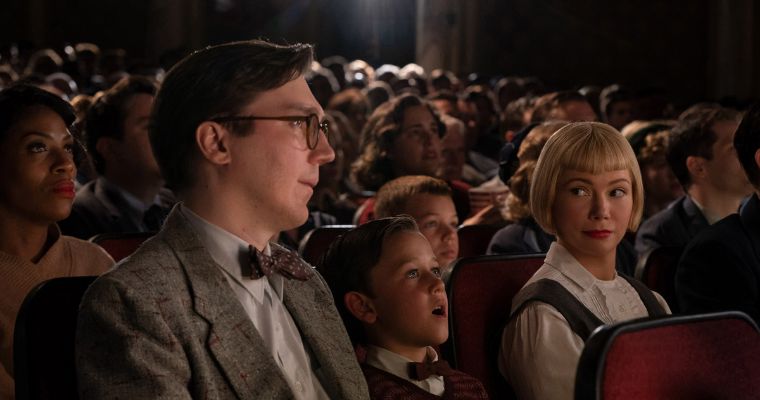
Paul Dano, Mateo Zoryan Francis-DeFord and Michelle Williams in a scene from "The Fabelmans." (Photo: Merie Weismiller Wallace/Universal Pictures and Amblin Entertainment.)
They're vast, those distances. Not from a physical point of origin to a far-flung destination, but within family members of different generations. Rarely is this notion more apparent than during the holidays, when loved ones who rarely see each other the rest of the year.
Some of these families choose to catch a movie at their local multiplex or independently run theater, likely seeking some escapism and, in some cases, an excuse to not have to talk to each other and unearth lingering fissures. The joke's on them, because if they spent part of their Thanksgiving weekend seeing one of the three movies I'm taking a closer look at this week, they likely saw some of their own unresolved issues staring right back at them on the big screen.
Two of these films are high-profile box office underperformers featuring some big names; the third is a smaller release that had a brief South Florida theatrical run last month and is now available to view at home. Are they worth the awkward, possibly uncomfortable conversations they might trigger afterwards? Let's dive in.
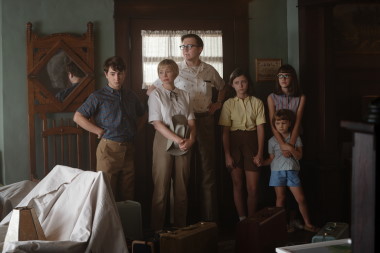
Gabriel LaBelle, Michelle Williams, Paul Dano, Keeley Karsten, Julia Butters and Sophia Kopera in a scene from "The Fabelmans." (Photo: Merie Weismiller Wallace/Universal Pictures and Amblin Entertainment.)
“The Fabelmans”: It was bound to happen sooner or later. Steven Spielberg, his days as a virtuoso wunderkind long behind him, had an itch to explore his formative years. He has scratched that itch in this gentle, pleasantly vignette-driven domestic drama that traces his love affair with moving pictures and how it intersected with the disintegration of his parents' marriage. Changing the names grants the now 75-year-old filmmaker increased creative license, and also yields an overly idealized family portrait that too often pulls its punches.
But “The Fabelmans,” a polished home movie of sorts that genially walks a tightrope between roman à clef and a therapy session, is a treat all the same, especially for those of us who grew up so pervasively influenced by Spielberg's body of work that to this day we think of him as our favorite uncle. He whips up his cast, a blend of A-listers and charismatic younger players, into shape with elder-statesman-of-Tinseltown ease. The “Jaws” and “Schindler's List” auteur weaves in a complex depiction of his creative impulse within the confines of a coming-of-age tale: how it became a coping mechanism and an armor to shield himself against life's vicissitudes, both at home and out in a hostile world.
But before movies became his obsession, they were the stuff of nightmares, literally. The film begins on a frigid night in 1952 when his stand-in, Sammy Fabelman (Mateo Zoryan Francis-DeFord), is taken on his very first movie outing. The evening's entertainment? Cecil B. DeMille's “The Greatest Show on Earth.” One sequence in particular, a train robbery committed by a bandit-turned-circus-clown played by James Stewart, frightens and fascinates the saucer-eyed lad in equal measure. His parents, Mitzi (Michelle Williams) and Burt (Paul Dano), worry their movie night selection might have been a bit too much too soon, but a match has been lit.
The best part of these early scenes is the chance they give Spielberg to show how his younger self learned how the medium works, not just as a salient plot point, but a malleable material to bend into all sorts of shapes. Play-Doh for the imagination, if you will. Working from a screenplay he co-wrote with frequent collaborator Tony Kushner, the filmmaker wastes little time in showing the transition from Sammy the awestruck spectator to Sammy the gung-ho, DIY storyteller.
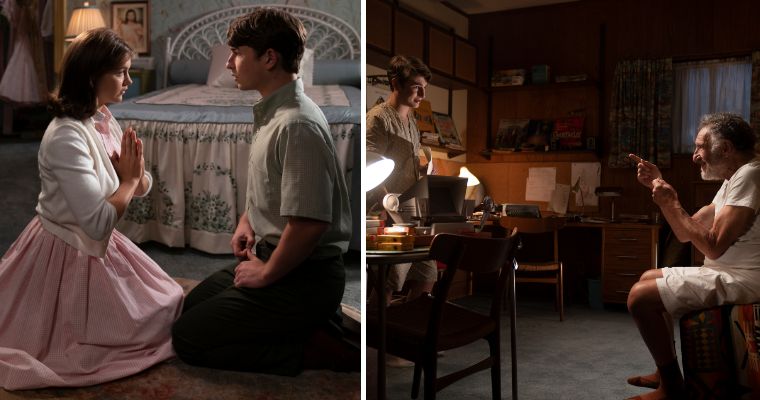
LEFT: Chloe East and Gabriel LaBelle in a scene from "The Fabelmans."RIGHT: Gabriel LaBelle and Judd Hirsch in a scene from "The Fabelmans." (Photos: Merie Weismiller Wallace/Universal Pictures and Amblin Entertainment.)
Played as a teen by Gabriel LaBelle (a dead ringer for his character's real-life counterpart), Sammy finds himself repeatedly pointing out to his dad that this movie thing is not a hobby. He also discovers that the camera can reveal truths he's not prepared to confront. Namely, that his mother's bond with Bennie (a nebbishy Seth Rogen), her husband's co-worker and best friend, may not be entirely platonic. It's a shadow that clouds Sammy and Mitzi's fierce bond, but it also leads to some lovely mother-and-son moments.
These scenes would certainly be more powerful had the dialogue in “The Fabelmans” hewed closer to the simplicity Melissa Mathison brought to her “E.T.” screenplay, itself a visceral depiction of a broken home. In Kushner's hands, however, the characters speak in self-help slogans and life wisdom nuggets. The lines are insightful and profound, delivered whenever the characters are not talking over each other in a way that recalls Spielberg's 1970s films. The dialogue bears Kushner's trademark elegance and philosophical curiosity, but it's an ill fit for this particular story; less could have been so much more.
Also disheartening is the way Spielberg soft-pedals the magnitude of the pain Mitzi and Burt's breakup in slow motion inflicts on their children. Williams and Dano glean considerable mileage from their characters' respective body language, Dano's skillful underplaying a marked and effective contrast to Williams' go-big-or-go-home bravado. What's in short supply here is an immediacy of the traumatic upheaval the children experience. (The film, for example, shows precious little interest in fleshing out Sammy's sisters.) These are blows that should not be cushioned, something the younger Spielberg appeared to understand intuitively.
More successful is the portrayal of the bullying Sammy endures in high school after the family moves to Northern California, as well as his haphazard fumbling into something resembling romance with Monica Sherwood (the vivacious Chloe East), his devoutly Christian classmate. At two and a half hours, though, “The Fabelmans” could have used more narrative momentum.
But even if the whole amounts to less than the sum of its parts, some of those parts are grandly entertaining, beginning with Williams' bracingly showy star turn. There is no reason for the Oscar nominee to hold back, and the film is infinitely richer with her in it. Also leaving an impression is Judd Hirsch as Mitzi's gruff, boisterous brother. He's only onscreen for about 10 minutes, but his theatricality is the shot in the arm the film needed at the time of his appearance.
Then there's “The Fabelmans'” joyous finale, involving an encounter between Sammy and a certain icon of moviedom that's best left for you to discover on your own. No spoilers, but the scene ends the movie on an exuberant high, hitting a playful note that feels perfectly judged, encapsulated in one of Uncle Steven's most irresistible closing shots. The film that precedes this moment too often plays like a victory lap, but it nevertheless hits comforting grace notes in its peek behind the celluloid curtain.
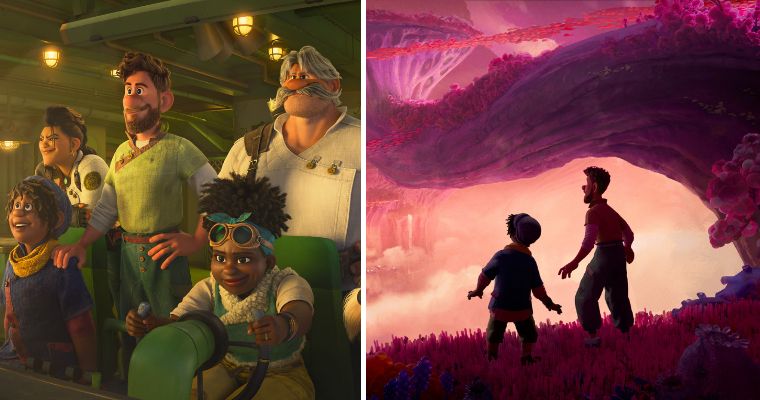
LEFT: The voices of Jaboukie Young-White, Lucy Liu, Jake Gyllenhaal, Gabrielle Union and Dennis Quaid in a scene from "Strange World." RIGHT: The voices of Jaboukie Young-White and Jake Gyllenhaal in a scene from "Strange World." (Photos: © 2022 Disney)
“Strange World”: What happens when you grow up in the shadow of a hulking man of adventure? If you're Searcher Clade, you harbor crippling low self-esteem and an inferiority complex. You're torn between living up to your father's ideals and pursuing your innate desire to heal the world.
The dilemma might sound like the building blocks of an existential character study, perhaps directed by Robert Eggers and released by A24, but it's actually the conflict driving Disney's year-end animated extravaganza (the studio's 61st animated feature), an eye-popping odyssey that puts an environmentally conscious, decidedly 21st-century spin on Jules Verne's “Extraordinary Voyages.”
Searcher (the voice of Jake Gyllenhaal) and his father, brawny explorer Jaeger Clade (Dennis Quaid), have a falling out in the middle of a mission with the fate of their realm, Avalonia, hanging in the balance. A clash in worldviews materializes in physical form after Searcher discovers a plant that appears to be a source of renewable energy. Frustrated and stubborn, Jaeger refuses to consider his son's contention, that they have found the solution to their problems, and opts to continue on his own after the rest of the expedition sides with Searcher. The Clade patriarch is not heard from since.
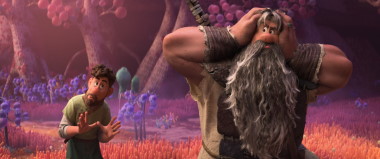
The voices of Jake Gyllenhaal and Dennis Quaid in a scene from "Strange World." (Photo: © 2022 Disney)
The bulk of “Strange World” unfolds years later, when Searcher, now a family man in a biracial marriage to Meridian (Gabrielle Union), has become a thriving farmer, and Avalonia has blossomed into utopian harmony. But when Pando, the wonder plant that makes their world go round, starts faltering, Searcher reluctantly joins the mission to determine what's wrong, and embarks on a collision with destiny, as well as some trippy sights for us to ooh and ahh over.
What ensues gets bogged down, not only by the Disney formula's shopworn beats, but by a central adventure that feels awfully underdeveloped and malnourished, more an assembly of storyboarded concepts than a fully fledged narrative. But “Strange World” is elevated by its unerring sense of wonder, its refreshingly cartoonish character designs and, most gratifying of all, an unabashedly progressive outlook.
How progressive? Searcher and Meridian's teenage son Ethan (Jaboukie Young-White) has grown up in a world without a stigma attached to LGBTQ+ people, so when he realizes he likes boys, his parents, and the movie, views his sexual orientation as a non-issue.
In case you're wondering, director Don Hall and co-director Qui Nguyen rip off that Band-Aid pretty early on. It might sound like a tangential element, but “Strange World” sails into uncharted territory, particularly for a big-budget, family-oriented studio release, precisely because it treats Ethan's (disarmingly wholesome) queerness as no big deal. It's a noteworthy baby step, one that threatens to vanish into the ether due to the film's poor box office showing. Here's hoping the Mouse doesn't learn the wrong lessons from this big-hearted yarn's low revenue. I'm not holding my breath either.
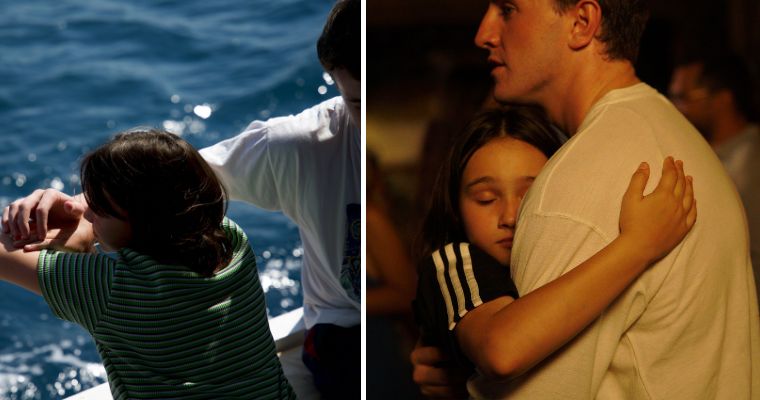
LEFT: Frankie Corio and Paul Mescal in a scene from "Aftersun."RIGHT: Frankie Corio and Paul Mescal in a scene from "Aftersun." (Photos A24.)
“Aftersun”: The whirr of a Mini DV camcorder takes Sophie back to that trip she took to a Turkish resort two decades ago. It was the holiday when she turned 11, and the final moments she spent with her dad.
On paper, the feature directing debut of Scottish filmmaker Charlotte Wells sounds like your basic indie two-hander, a father-daughter story set to the leisurely rhythms of a summer vacation. But in its collage of images, a mix of unedited home video and lyrical sun-dappled vistas, the writer-director is aiming for something more ambitious and challenging: the ethereal nature of memories, how they swirl around us, just out of our reach.
Wells deliberately withholds information that a more conventional effort would dole out at certain intervals. Tween Sophie (Frankie Corio) and her dad Calum (Paul Mescal) make small talk, bicker and ask about each other's lives in a dynamic that feels about as much as two friends than a father and daughter. When someone mistakes them for siblings, it comes as no surprise.
As a viewer, you might find yourself oscillating between surrendering to the laid-back travelogue and an impulse to demand concrete answers. Sophie's mother is an abstract presence on the other side of a landline. How was the parents' marriage? Were they even married? Why is Calum wearing a cast on his forearm? And is that actually him flirting with the (male) scuba instructor?
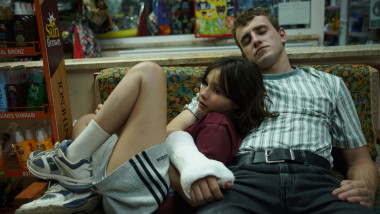
Frankie Corio and Paul Mescal in a scene from "Aftersun" (Photo: A24)
But “Aftersun” stays as mum as a sphinx. Wells wisely chooses not to keep returning to the adult Sophie (Celia Rowlson-Hall). That way, her limited screen time is all the more poignant. At several points, her younger self comes across as the adult in this relationship, wise and grown up beyond her years, and yet still very much a girl whose love for her father is intertwined with questions that remain unanswered. In the film's most piercing exchange, she calls out Calum on making promises he knows he won't be able to keep.
“Aftersun” is comprised of such perceptive small moments, tiny shards of leisure and ennui that add up to something bigger. Flashes of inner turmoil coexist with the pleasures of dancing the macarena. Intimate silences rub shoulders with quotidian details other filmmakers would opt to ignore.
Wells has said the film is inspired by events in her own life, and its cumulative effect is cathartic. Anchored by two outstanding lead performances, “Aftersun” snatches the past, turning a faded Polaroid into a tangible web of contentment and the inexorable ache of loss. How to describe the ineffable mood it captures? It's a mosaic bridging past and present, a passing breeze that caresses the spirit. It's not until it's over that you realize how much of a wallop this film, small only in size, packs.
“The Fabelmans” is opening at the Coral Gables Art Cinema. It, along with “Strange World” are also playing in other theaters across South Florida, including Regal South Beach, AMC Aventura 24, The Landmark at Merrick Park in Coral Gables and Cinépolis Luxury Cinemas in Coconut Grove. “Aftersun is now available on premium video on demand platforms, and “The Fabelmans” will follow on its PVOD footsteps on Dec. 13. “Strange World” is set to hit Disney Plus soon, though as of this writing, an official date has not been announced.
 MAIN MENU
MAIN MENU

